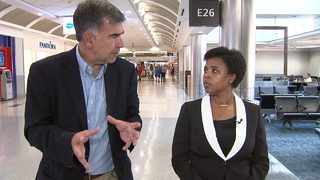A ranking FBI agent revealed to Channel 2 investigative reporter Mark Winne that the Joint Terrorism Task Force in Georgia has at least a dozen investigations underway into suspected homegrown violent extremists.
“There have been a number of instances where we have followed a threat very, very closely and mitigated that threat,” FBI Special Agent in Charge David LeValley said.
“A real threat? Something that turned out to be a real threat? Something that could’ve hurt people?” Winne asked.
“Exactly,” LeValley said.
FBI Atlanta Assistant Special Agent in Charge Ricardo Grave de Peralta says he used to fight terrorism as a Navy SEAL, but now a big part of his job is seeing that terrorists, domestic or international, can't seal the deal on terror plots in Georgia.
Grave de Peralta is a supervisor over the FBI-led Joint Terrorism Task Force, or JTTF, in Georgia.
He says the unknown is the greatest tension in the task force's investigations.
“Doing a terrorism investigation is like doing a puzzle, a 1,000-piece puzzle,” he said.
Channel 2 Investigates:
- Doctor who made music videos in operating room facing several malpractice lawsuits
- Synthetic weed smokers, beware: CDC says new ingredient could kill you
- Georgia school lockdown drills triple after Florida school shooting
Grave de Peralta says he was there in 2012 when agents arrested Randy Wilson Jr., of Mobile, Alabama, as he tried to fly overseas, ultimately to wage violent jihad.
“He was boarding a plane on the jetway,” Grave de Peralta said.
He says co-defendant Mohammad Abukhdair boarded a bus in Atlanta and was arrested in Augusta on his way to Canada, where he planned to take a flight, because he was on a no-fly list in the U.S.
The No-Fly list
FBI supervisor Ashley Johnson heads a multiagency unit that acts as the JTTF's arm at the Atlanta airport and helps with situations involving the no-fly list.

“Oftentimes we’ll get notified if there’s a no-fly subject or if there’s a known suspected terrorist who’s attempting to fly or he’s being downgraded and allowed to fly, maybe to support an investigation or gain information,” she said.
“Is that something that happens say, pretty much every month?” Winne asked.
“Yes,” Johnson said.
Johnson’s unit investigates any potential federal case at the airport, but says the unit's main objective is to root out any terrorist nexus.
LeValley said his team is working around the clock to protect Georgians.
“The pressure can be tremendous, depending on the flood of tips and cases that we happen to be working at any given time,” LeValley said.
Concerns about homegrown terrorists
Both Grave de Peralta and LeValley say the threat is even greater now than it was in the days after 9/11.
“The face or the threat of international terrorism has changed,” LeValley said. “We are seeing homegrown violent extremists consuming propaganda on their own.”

“The threat is greater because they are now reaching out to individuals here in the U.S. and radicalizing them online. Whats App is something terrorists use for encrypted communications, believe it or not, typically in a manner that makes it very difficult for us to identify exactly who these people are,” Grave de Peralta said.
He said while the messaging is sophisticated, the attacks often are not.
“Whether it was the Pulse nightclub shooting, the shooting in San Bernardino or even recently the attack in New York, where it was simply an individual simply renting a truck and driving it down a bike path,” Grave de Peralta said. “What we are encountering now a lot of juveniles and youth that are being radicalized online from ISIS.”
Cox Media Group




